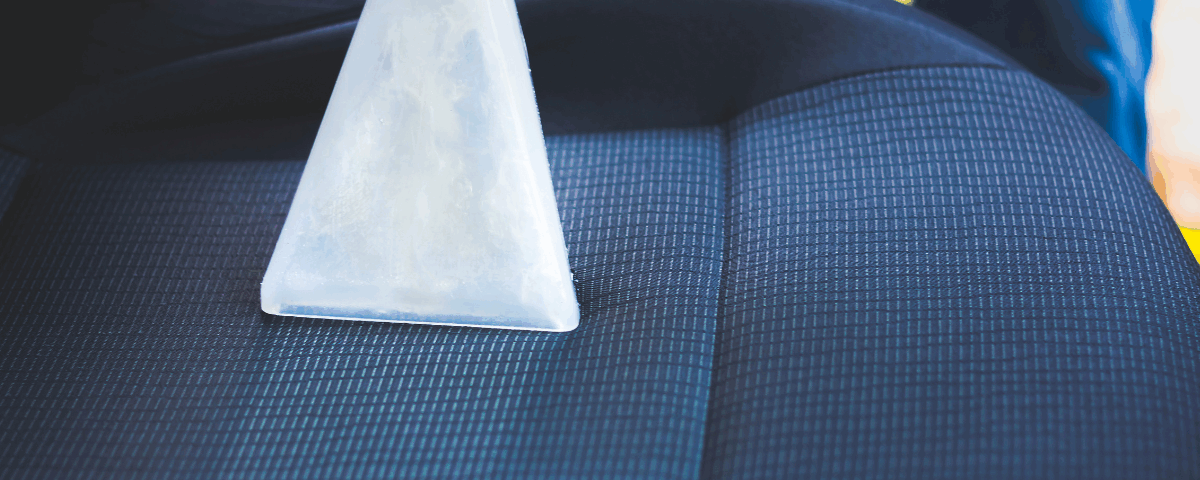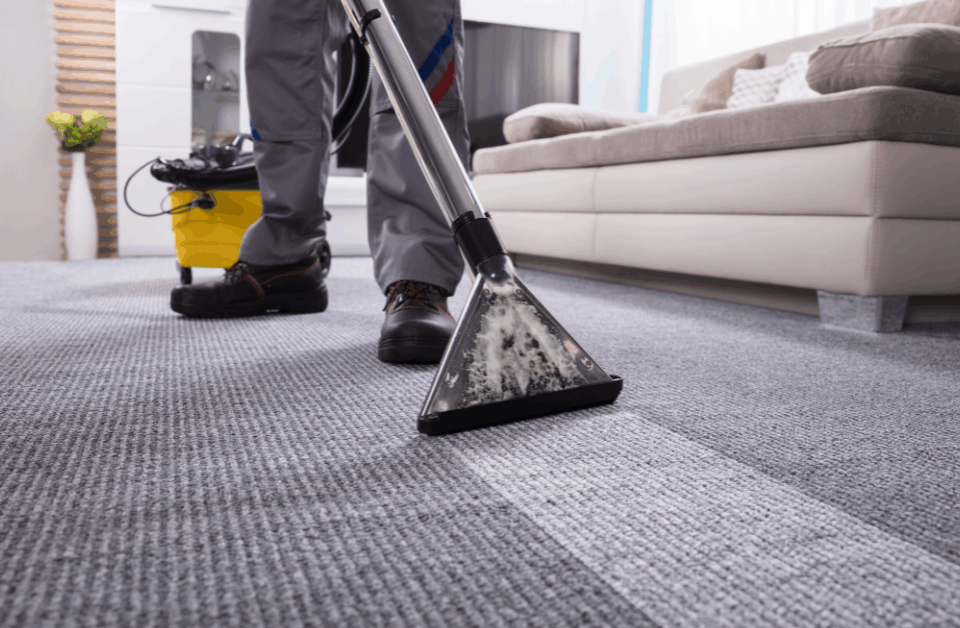
The Easiest Carpets to Clean — And The Hardest
June 11, 2025
Everything to Know About Maintaining and Cleaning Commercial Carpets
August 13, 2025Americans spend around an hour per day driving. As time in the car adds up, so does the possibility for dirt buildup and spills. Unless you’re meticulous about your car care, you’re probably going to need a car upholstery cleaning at some point, especially if you have kids or pets.
There are actually quite a few options for car owners who want to keep their vehicle’s upholstery clean, but the best method for you depends on how set the stains are, what kind of equipment you’re willing to rent or buy, the type of seats you have, and how much time you’re willing to devote to upholstery cleaning. We’ll go over all of these possibilities and more in our article.
Daily Habits for a Cleaner Car Interior
If you’re looking for a way to avoid cleaning your car altogether, here are some simple strategies for keeping your interiors spotless:
- Shake out floor mats frequently to prevent dirt from getting transferred onto your seats.
- Vacuum your seats and hard-to-reach crevices at least weekly. Pay particular attention to seams and folds, as these can collect debris fast.
- Wipe surfaces with a microfiber cloth to remove dust and keep them looking tidy.
- Clean up spills immediately. The quicker you respond to a mess, the less likely it’ll leave a stain.
- Invest in seat covers. They’re a solid barrier against dirt, spills, and wear, and can be easily removed and washed whenever needed.
How Your Car’s Upholstery Materials Impact Your Cleaning Options
Not all car seats are made the same, and the ease of cleaning varies greatly depending on their material.
Fabric or cloth seats tend to offer comfort but can absorb spills quickly, making them moderately difficult to clean.
Leather upholstery, on the other hand, resists most liquid spills but can still become stained if not wiped up quickly. Leather requires a bit more care; you should use a pH-balanced cleaner and a dedicated leather conditioner to prevent cracking and fading, and always avoid harsh products.
Faux leather or vinyl seats are among the easiest to maintain. Most spills wipe up easily, and a damp cloth paired with a gentle cleaner will take care of everyday grime. Just make sure you steer clear of strong chemicals, which can cause vinyl to dry out or crack over time.
Seats upholstered in suede or alcantara add a luxurious touch but are the most challenging to maintain. These sensitive materials are very prone to watermarks and can be easily stained. If you have suede or alcantara in your car, use special foam cleaning products and minimal moisture, always handling them gently to prevent damage.
Car Upholstery Cleaning: Try These DIY Approaches
When a basic clean isn’t enough, keep these essentials handy:
- Vacuum with a crevice tool
- Soft-bristle brush
- Microfiber towels
- Upholstery cleaner suited to your seat material
DIY Cleaning Steps
- Always start by vacuuming thoroughly to keep from rubbing dirt further in.
- Test any cleaner on an out-of-sight spot before applying it more broadly.
- Spray your cleaner sparingly, scrub with a soft brush, and blot with a clean towel.
- Let the seats air dry—crack a window open if you can.
What Cleaner Should You Use?
Use pH-neutral cleaners for most fabric and leather seats, enzyme-based sprays for spills involving food or drink, and oxygenated solutions for really tough stains.
For a minor cleaning job, you may be able to get away with using a laundry detergent and warm water, or even baking soda and water for tougher stains.
Bleach and harsh chemical products are best avoided, as they can permanently harm your upholstery.
DIY Upholstery Machine Cleaning: When and How
You can buy an upholstery cleaning machine to clean your car seats yourself. A quality machine typically costs over $100 and requires a specialty cleaning solution. Cleaning with one of these machines involves spraying your seats down and sucking up the moisture. It will likely take you over an hour to complete a full interior clean.
Professional Car Upholstery Cleaning: The Extra Mile
Sometimes, your best bet for car upholstery cleaning is calling in the pros.
If your stains are large or stubborn, odors won’t go away, or you drive a luxury vehicle, professionals have the right tools and training for the job.
Expect deep vacuuming, pre-treatment for stains, fabric-specific methods, and multiple rounds of cleaning if necessary.
Choosing a reputable cleaner who uses safe, non-toxic solutions ensures your car interior gets the best possible care.
Is DIY or Professional Right for You?
It helps to ask yourself: Are your stains tough to tackle, or mostly surface-level? Do you have the equipment and know-how for a deep clean? Are you working with delicate materials? DIY is perfect for light messes and maintenance, but if you want a flawless finish, a professional can deliver quick, risk-free results.
Give Your Car the Fresh Start It Deserves
Smart daily habits and understanding how to care for your specific seat material will keep your car interior in excellent condition.
For a dramatic, lasting clean, consider scheduling a session with a professional car upholstery cleaning service like Windell’s Carpet Care. We have been cleaning carpets, upholstery, and other materials in the Southern Indiana area, including Greenville, New Albany, and Salem, since 1970.
With our help, your vehicle will look better than ever, and you’ll enjoy every minute you spend in your car that much more


